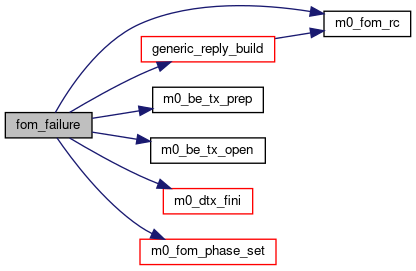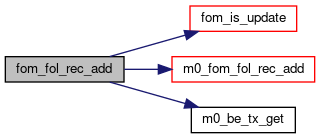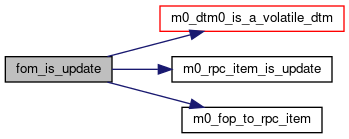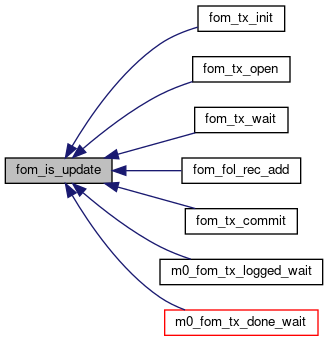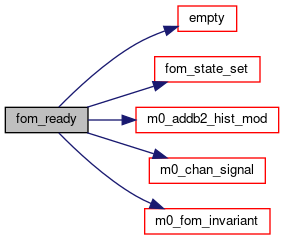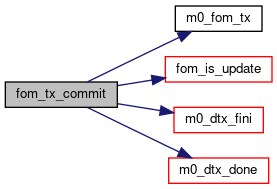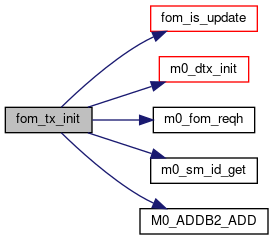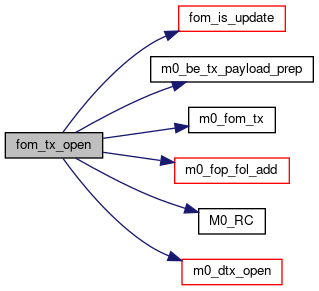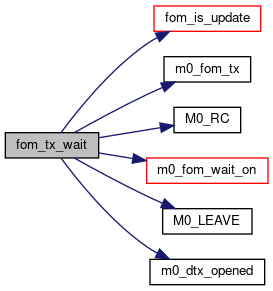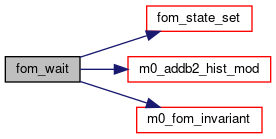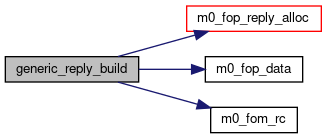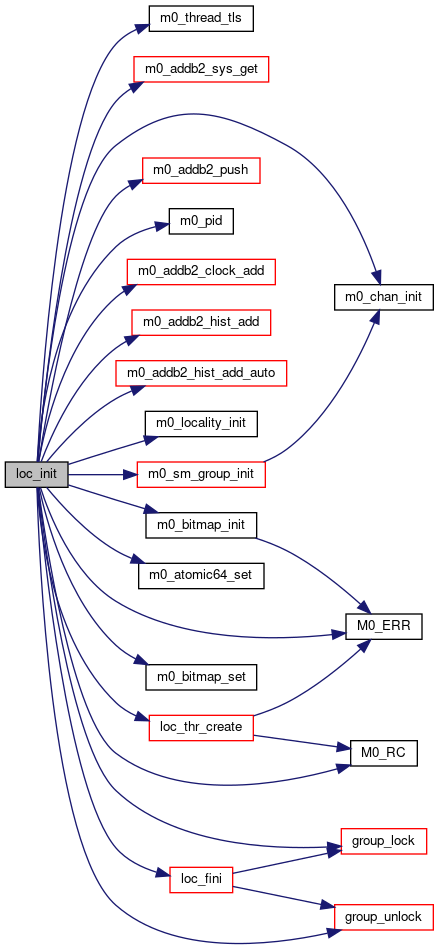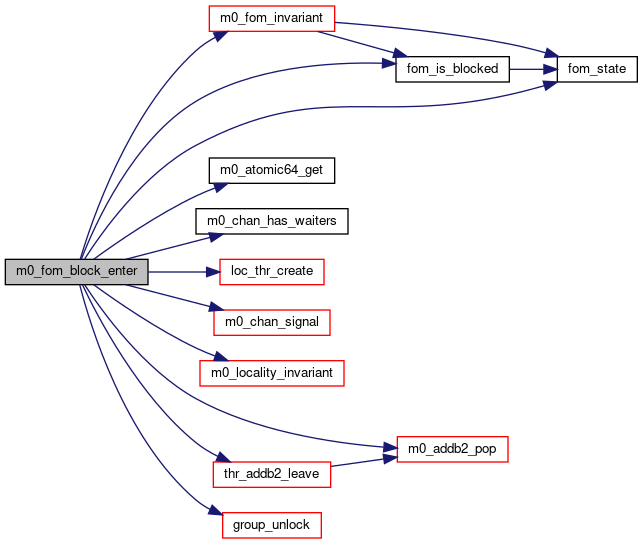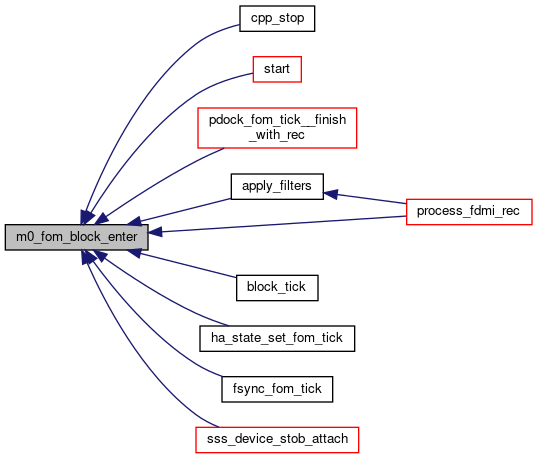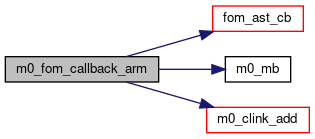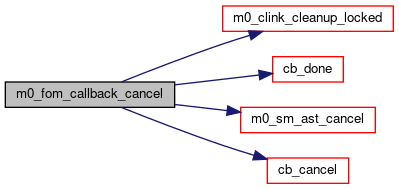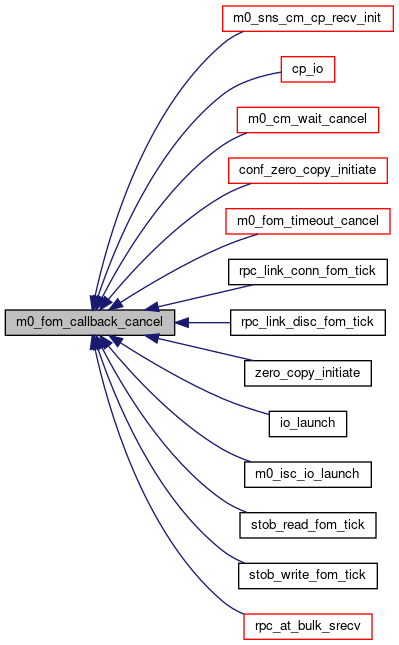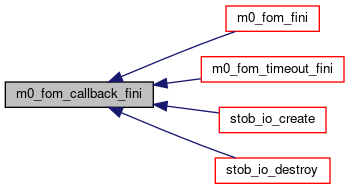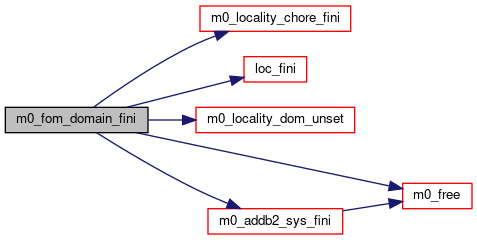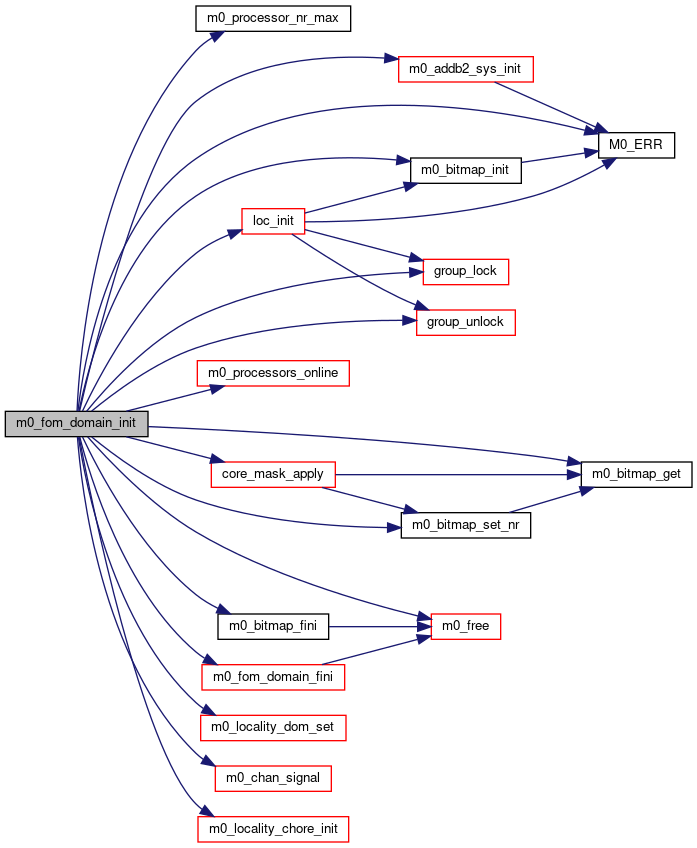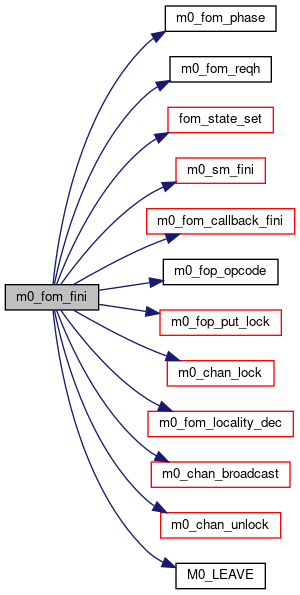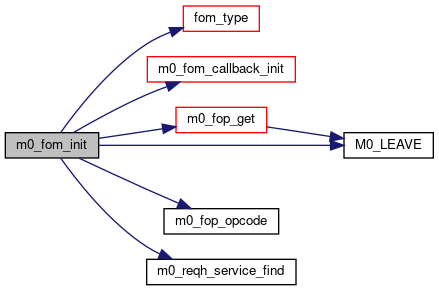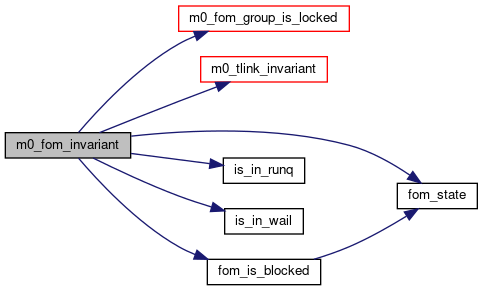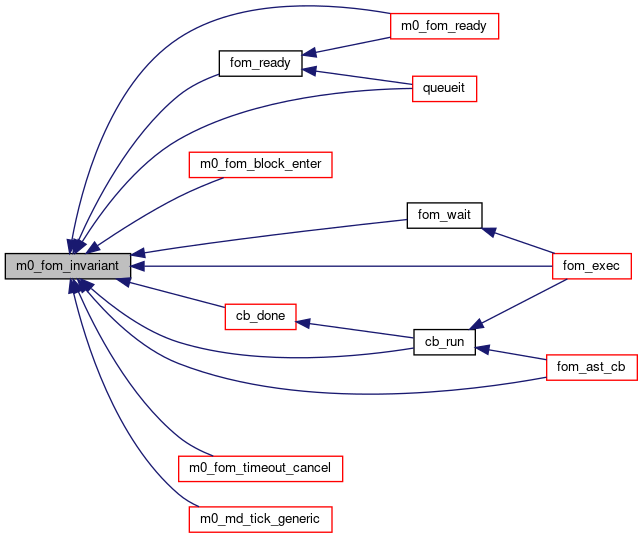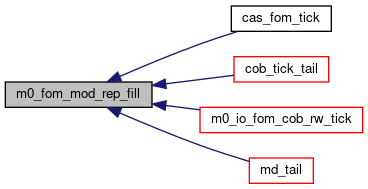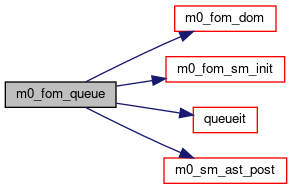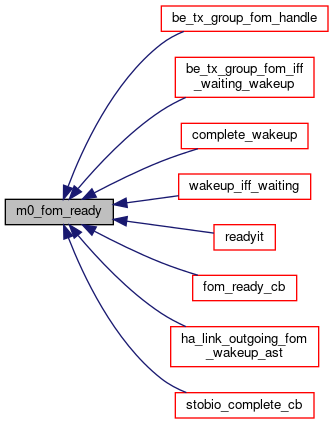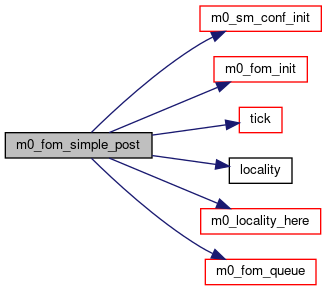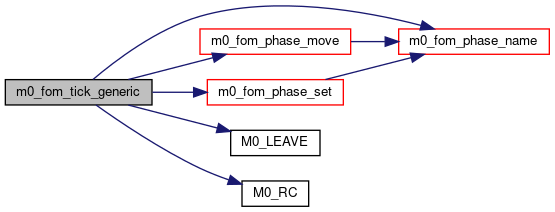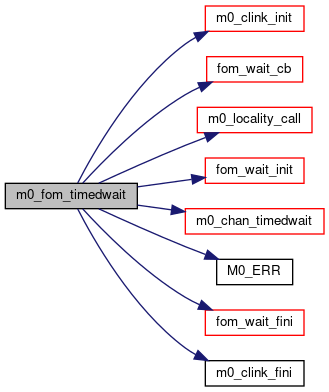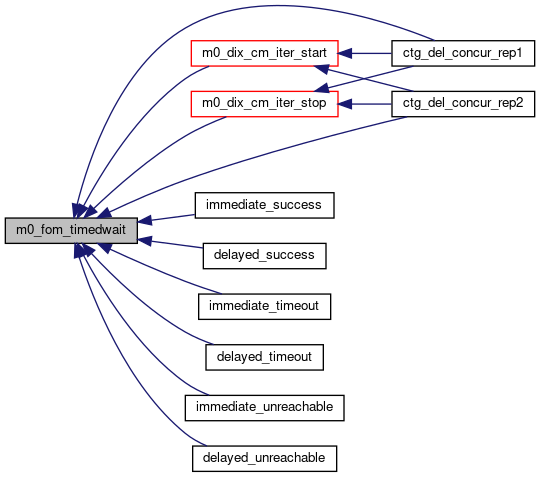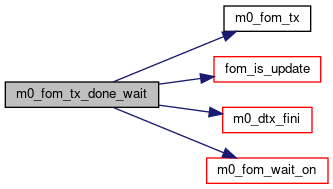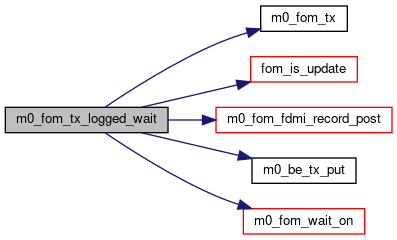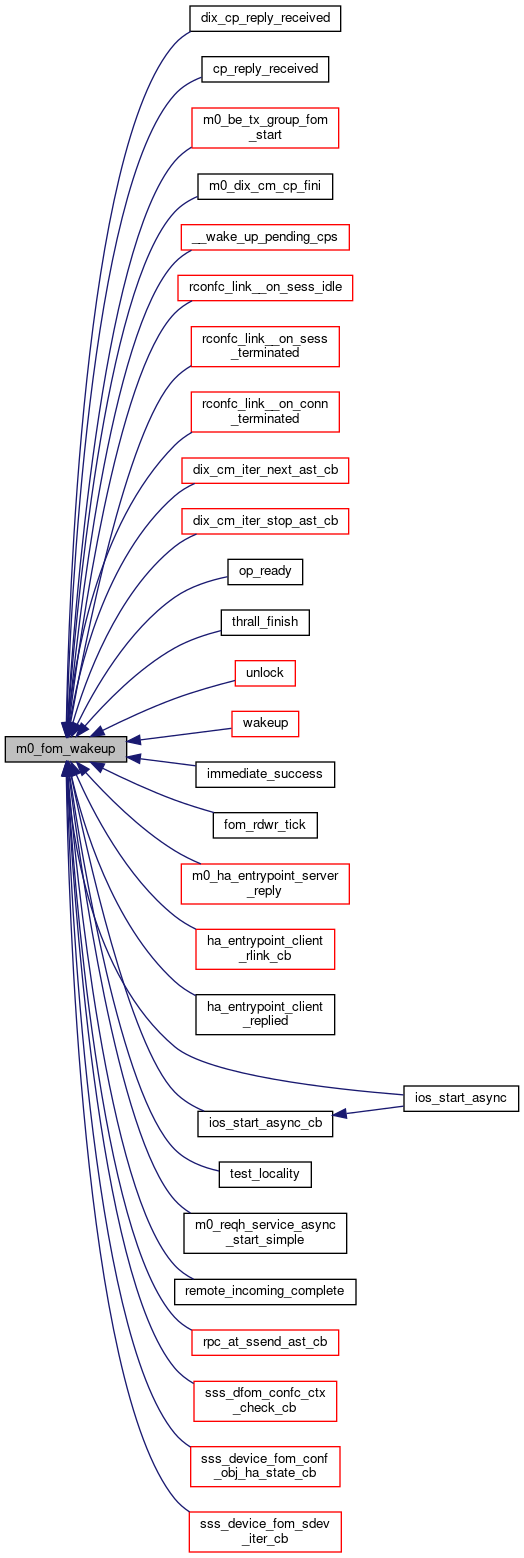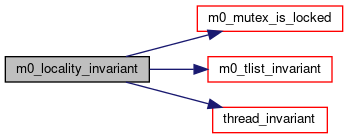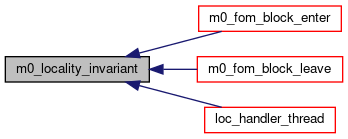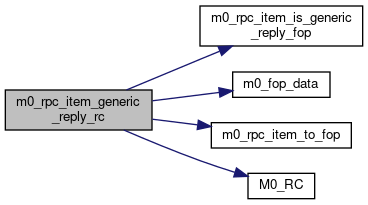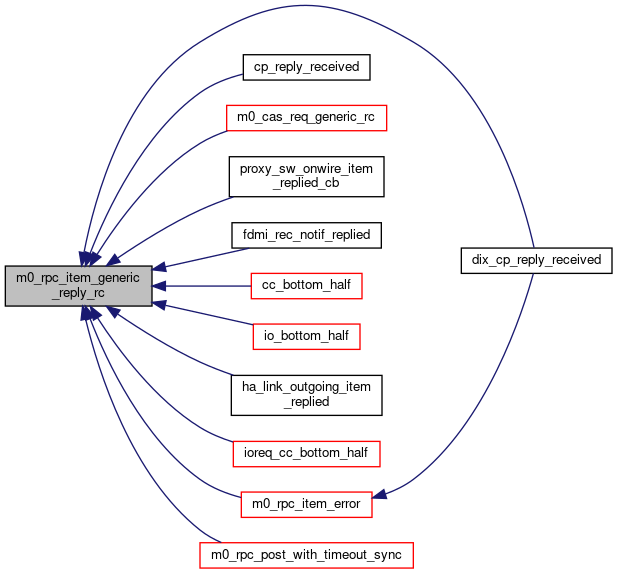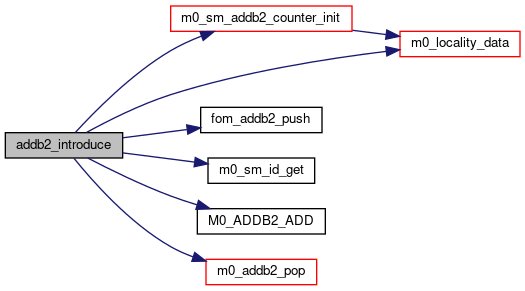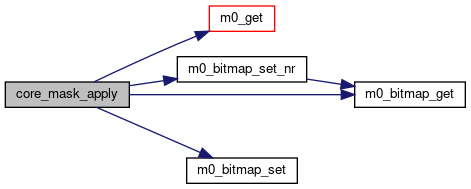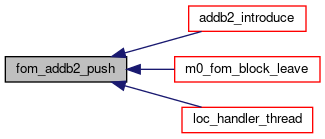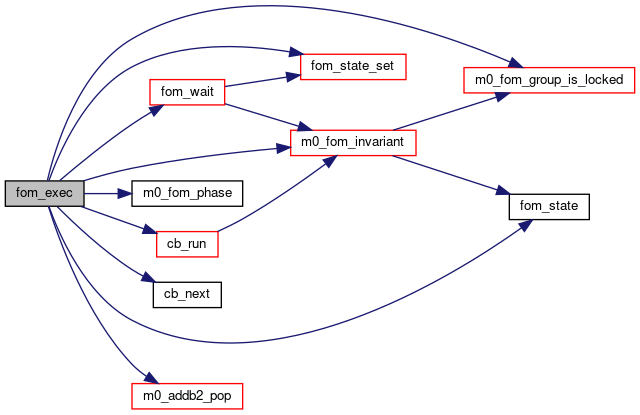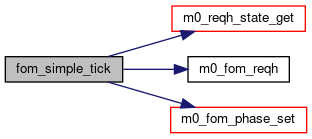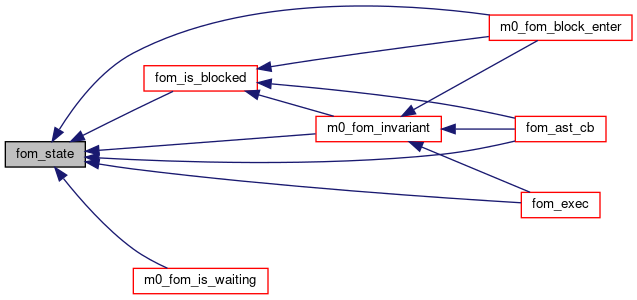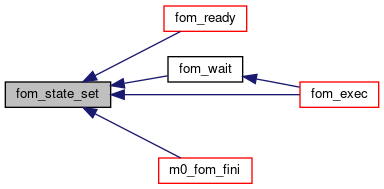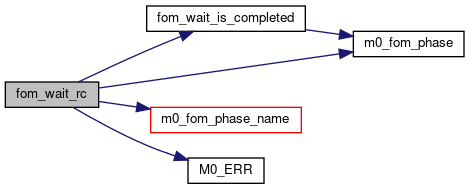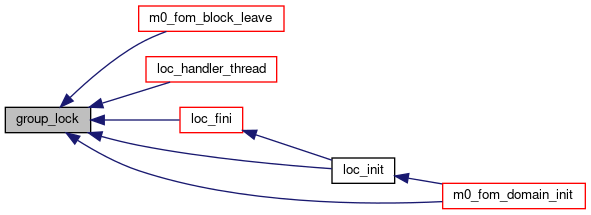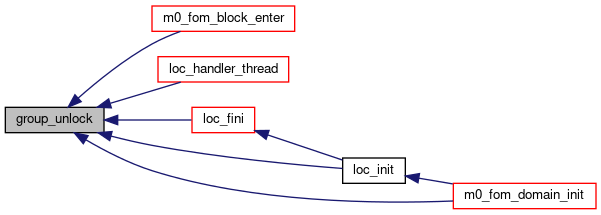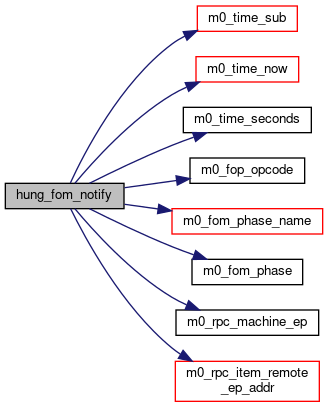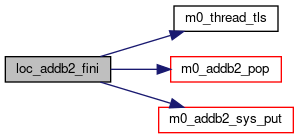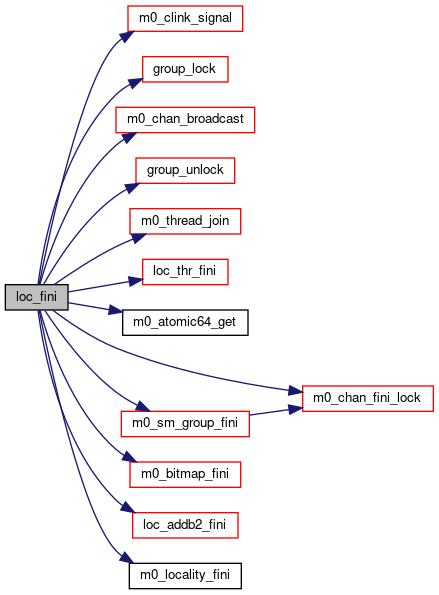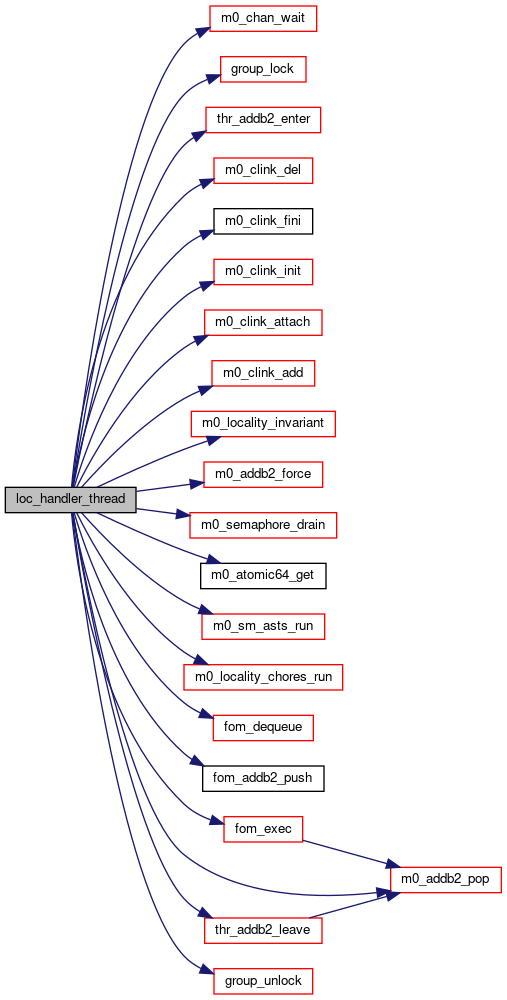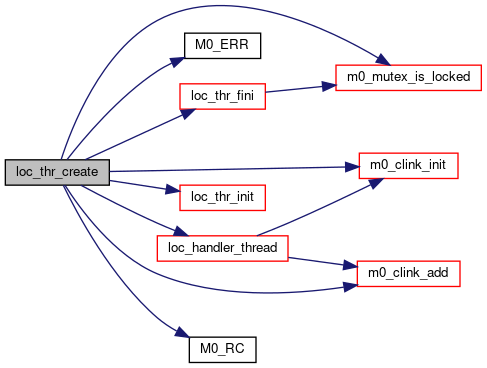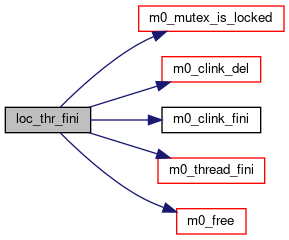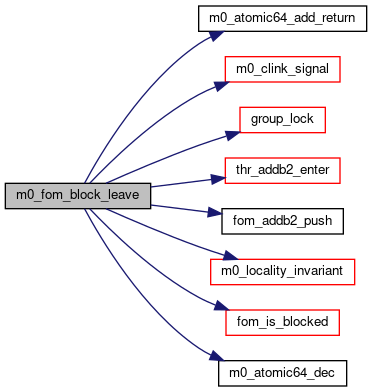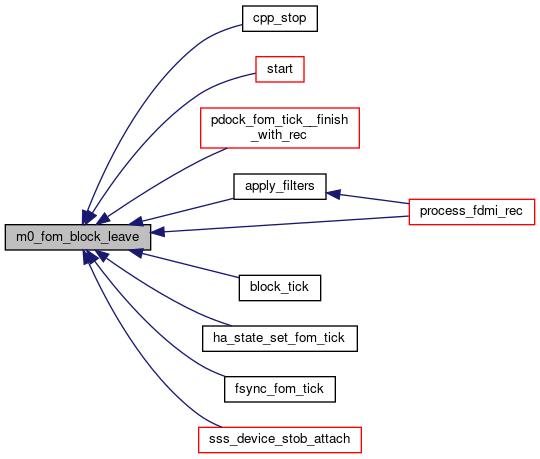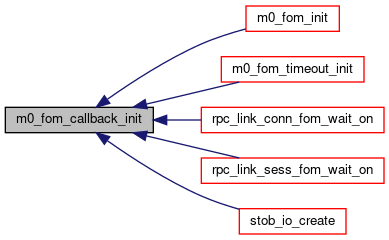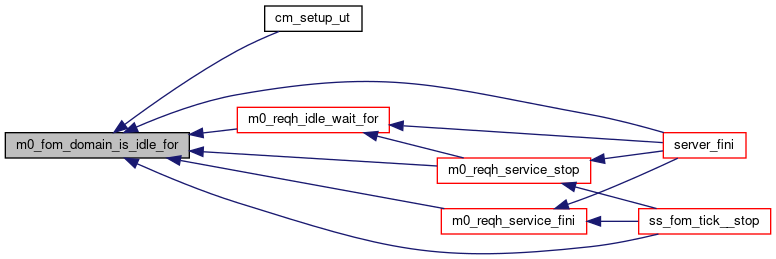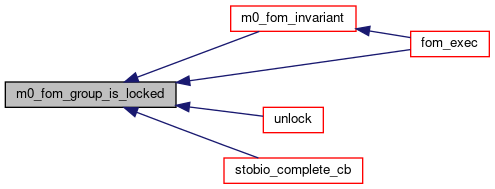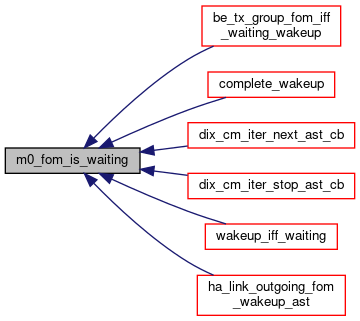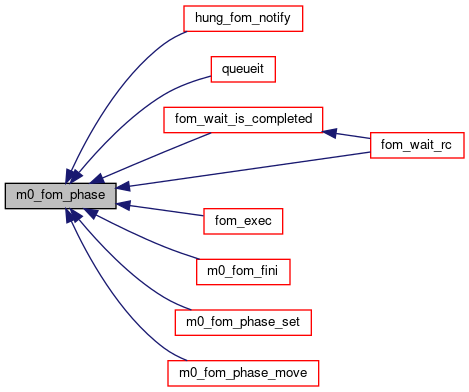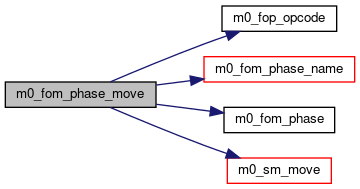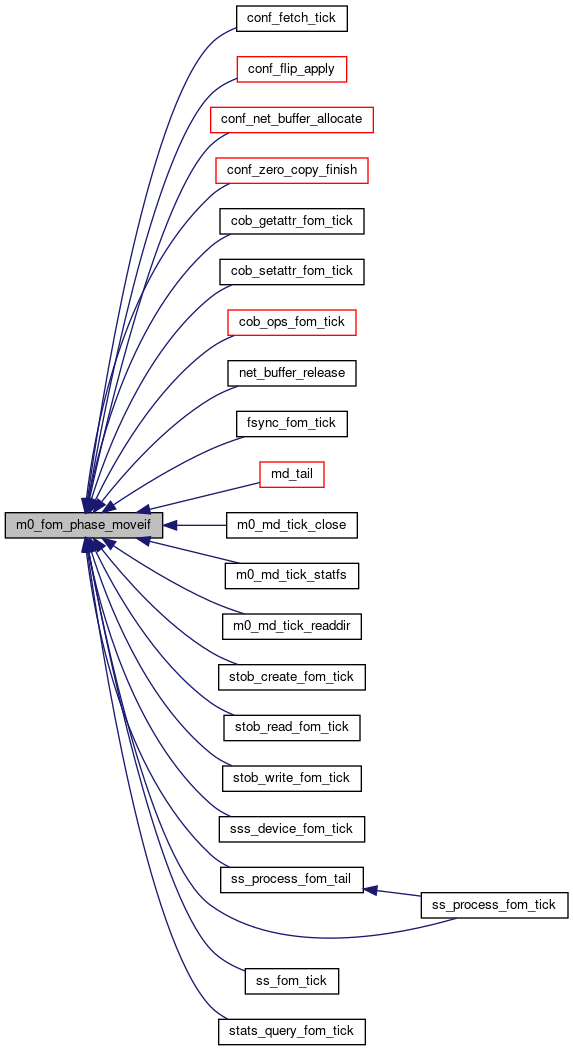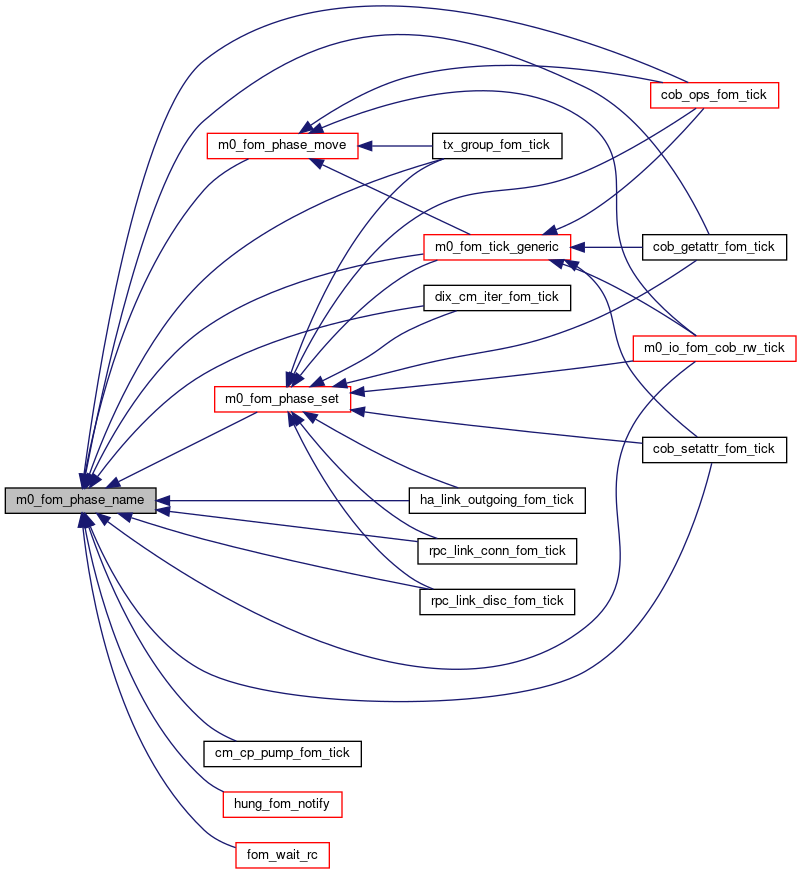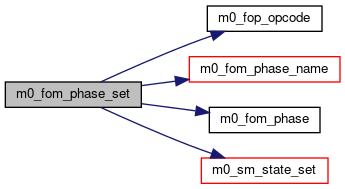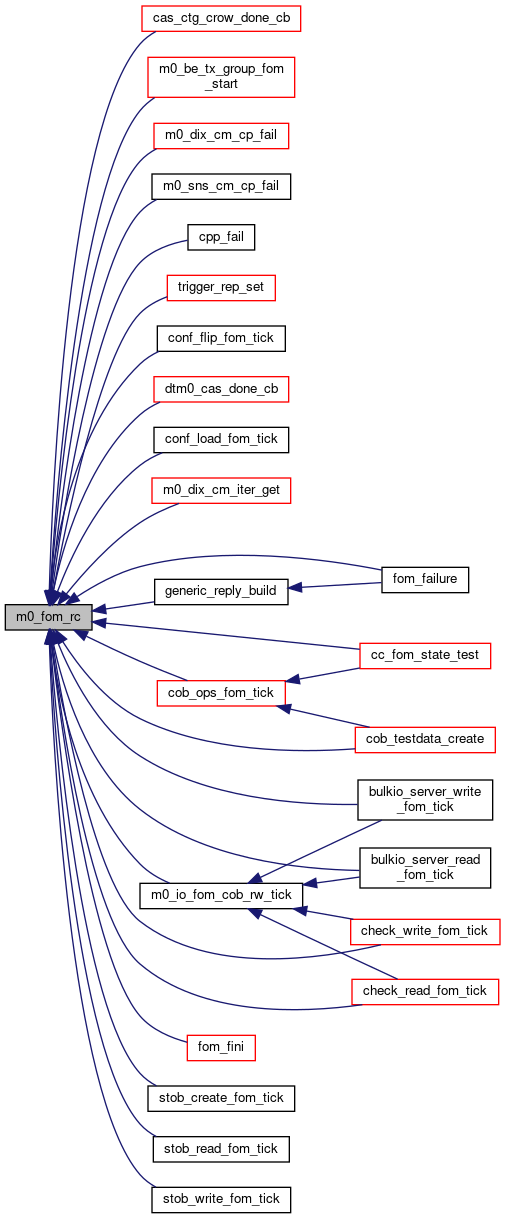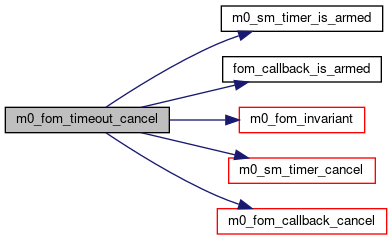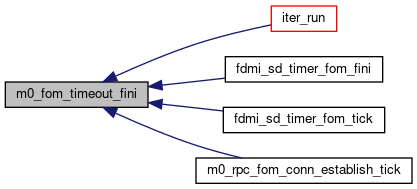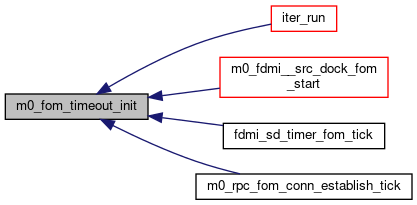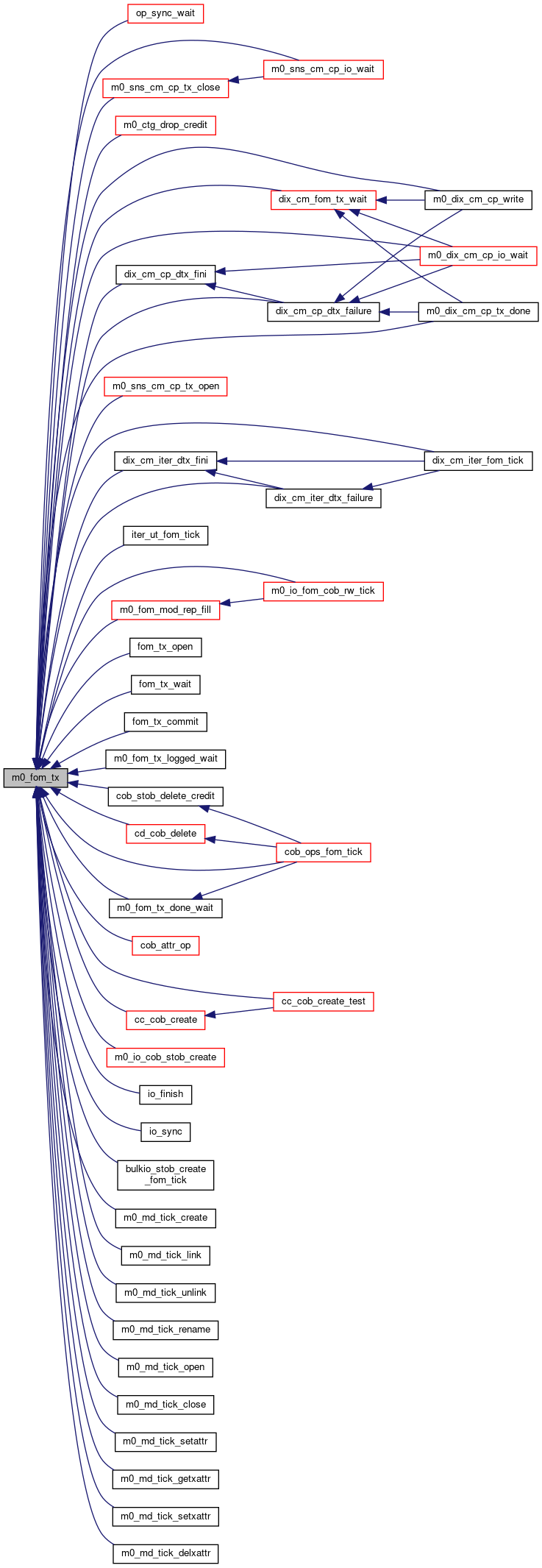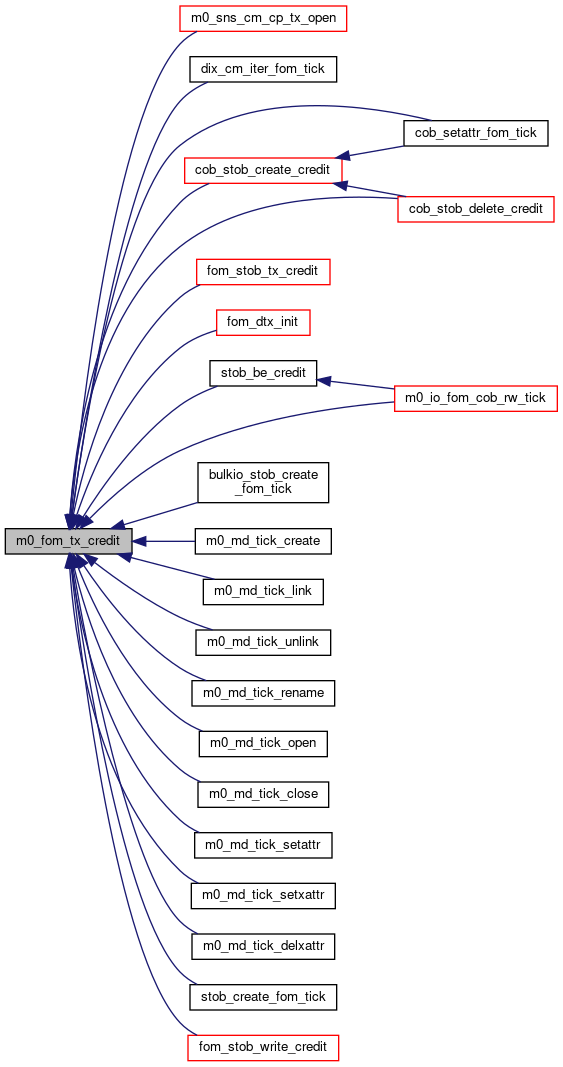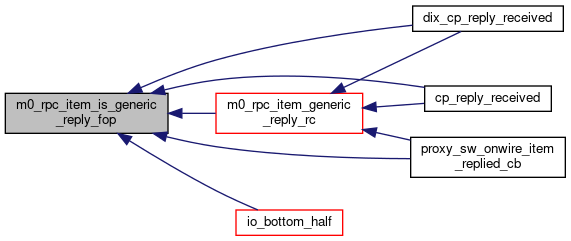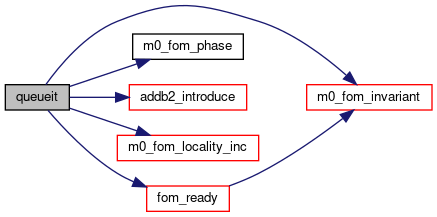|
| enum | { LOC_IDLE_NR = 1,
HUNG_FOP_SEC_PERIOD = 5,
HUNG_FOP_TIME_SEC_MAX = 2*60,
HUNG_FOP_TIME_SEC_IEM = 5*60
} |
| |
| enum | loc_thread_state { HANDLER = 1,
BLOCKED,
UNBLOCKING,
IDLE
} |
| |
| enum | m0_fom_state {
M0_FOS_INIT,
M0_FOS_READY,
M0_FOS_RUNNING,
M0_FOS_WAITING,
M0_FOS_FINISH
} |
| |
| enum | { M0_FOS_TRANS_NR = 8
} |
| |
| enum | m0_fom_phase { M0_FOM_PHASE_INIT,
M0_FOM_PHASE_FINISH,
M0_FOM_PHASE_NR
} |
| |
| enum | m0_fc_state { M0_FCS_ARMED = 1,
M0_FCS_DONE
} |
| |
| enum | m0_fom_phase_outcome { M0_FSO_WAIT = 1,
M0_FSO_AGAIN,
M0_FSO_NR
} |
| |
| enum | { M0_FOM_SIMPLE_HERE = 0xbedabedabedabeda
} |
| |
|
| | M0_TL_DESCR_DEFINE (thr, "fom thread", static, struct m0_loc_thread, lt_linkage, lt_magix, M0_FOM_THREAD_MAGIC, M0_FOM_THREAD_HEAD_MAGIC) |
| |
| | M0_TL_DEFINE (thr, static, struct m0_loc_thread) |
| |
| | M0_TL_DESCR_DEFINE (runq, "runq fom", static, struct m0_fom, fo_linkage, fo_magic, M0_FOM_MAGIC, M0_FOM_RUNQ_MAGIC) |
| |
| | M0_TL_DEFINE (runq, static, struct m0_fom) |
| |
| | M0_TL_DESCR_DEFINE (wail, "wail fom", static, struct m0_fom, fo_linkage, fo_magic, M0_FOM_MAGIC, M0_FOM_WAIL_MAGIC) |
| |
| | M0_TL_DEFINE (wail, static, struct m0_fom) |
| |
| static bool | fom_wait_time_is_out (const struct m0_fom_domain *dom, const struct m0_fom *fom) |
| |
| static int | loc_thr_create (struct m0_fom_locality *loc) |
| |
| static void | hung_foms_notify (struct m0_locality_chore *chore, struct m0_locality *loc, void *place) |
| |
| static void | group_lock (struct m0_fom_locality *loc) |
| |
| static void | group_unlock (struct m0_fom_locality *loc) |
| |
| M0_INTERNAL bool | m0_fom_group_is_locked (const struct m0_fom *fom) |
| |
| static bool | is_in_runq (const struct m0_fom *fom) |
| |
| static bool | is_in_wail (const struct m0_fom *fom) |
| |
| static bool | thread_invariant (const struct m0_loc_thread *t) |
| |
| M0_INTERNAL bool | m0_fom_domain_invariant (const struct m0_fom_domain *dom) |
| |
| M0_INTERNAL bool | m0_locality_invariant (const struct m0_fom_locality *loc) |
| |
| M0_INTERNAL struct m0_reqh * | m0_fom_reqh (const struct m0_fom *fom) |
| |
| static enum m0_fom_state | fom_state (const struct m0_fom *fom) |
| |
| static void | fom_state_set (struct m0_fom *fom, enum m0_fom_state state) |
| |
| static bool | fom_is_blocked (const struct m0_fom *fom) |
| |
| static M0_UNUSED struct m0_fom * | sm2fom (struct m0_sm *sm) |
| |
| M0_INTERNAL bool | m0_fom_invariant (const struct m0_fom *fom) |
| |
| static bool | hung_fom_notify (const struct m0_fom *fom) |
| |
| static void | fom_ready (struct m0_fom *fom) |
| |
| M0_INTERNAL void | m0_fom_ready (struct m0_fom *fom) |
| |
| static void | readyit (struct m0_sm_group *grp, struct m0_sm_ast *ast) |
| |
| static void | fom_addb2_push (struct m0_fom *fom) |
| |
| static void | addb2_introduce (struct m0_fom *fom) |
| |
| static void | queueit (struct m0_sm_group *grp, struct m0_sm_ast *ast) |
| |
| static void | thr_addb2_enter (struct m0_loc_thread *thr, struct m0_fom_locality *loc) |
| |
| static void | thr_addb2_leave (struct m0_loc_thread *thr, struct m0_fom_locality *loc) |
| |
| M0_INTERNAL void | m0_fom_wakeup (struct m0_fom *fom) |
| |
| M0_INTERNAL void | m0_fom_block_enter (struct m0_fom *fom) |
| |
| M0_INTERNAL void | m0_fom_block_leave (struct m0_fom *fom) |
| |
| M0_INTERNAL void | m0_fom_queue (struct m0_fom *fom) |
| |
| static void | fom_wait (struct m0_fom *fom) |
| |
| static bool | fom_wait_is_completed (const struct fom_wait_data *wd) |
| |
| static int | fom_wait_rc (const struct fom_wait_data *wd) |
| |
| static bool | fom_wait_cb (struct m0_clink *clink) |
| |
| static int | fom_wait_init (void *data) |
| |
| static int | fom_wait_fini (void *data) |
| |
| M0_INTERNAL int | m0_fom_timedwait (struct m0_fom *fom, uint64_t phases, m0_time_t deadline) |
| |
| static void | cb_done (struct m0_fom_callback *cb) |
| |
| static void | cb_run (struct m0_fom_callback *cb) |
| |
| static void * | cb_next (struct m0_fom_callback *cb) |
| |
| static void | fom_exec (struct m0_fom *fom) |
| |
| static struct m0_fom * | fom_dequeue (struct m0_fom_locality *loc) |
| |
| static void | loc_handler_thread (struct m0_loc_thread *th) |
| |
| static int | loc_thr_init (struct m0_loc_thread *th) |
| |
| static void | loc_thr_fini (struct m0_loc_thread *th) |
| |
| static void | loc_addb2_fini (struct m0_fom_locality *loc) |
| |
| static void | loc_fini (struct m0_fom_locality *loc) |
| |
| static int | loc_init (struct m0_fom_locality *loc, struct m0_fom_domain *dom, size_t idx) |
| |
| static void | core_mask_apply (struct m0_bitmap *onln_cpu_map) |
| |
| M0_INTERNAL int | m0_fom_domain_init (struct m0_fom_domain **out) |
| |
| M0_INTERNAL void | m0_fom_domain_fini (struct m0_fom_domain *dom) |
| |
| static bool | is_loc_locker_empty (struct m0_fom_locality *loc, uint32_t key) |
| |
| M0_INTERNAL bool | m0_fom_domain_is_idle_for (const struct m0_reqh_service *svc) |
| |
| M0_INTERNAL bool | m0_fom_domain_is_idle (const struct m0_fom_domain *dom) |
| |
| M0_INTERNAL void | m0_fom_locality_inc (struct m0_fom *fom) |
| |
| M0_INTERNAL bool | m0_fom_locality_dec (struct m0_fom *fom) |
| |
| void | m0_fom_fini (struct m0_fom *fom) |
| |
| void | m0_fom_init (struct m0_fom *fom, const struct m0_fom_type *fom_type, const struct m0_fom_ops *ops, struct m0_fop *fop, struct m0_fop *reply, struct m0_reqh *reqh) |
| |
| static bool | fom_clink_cb (struct m0_clink *link) |
| |
| static void | fom_ast_cb (struct m0_sm_group *grp, struct m0_sm_ast *ast) |
| |
| M0_INTERNAL void | m0_fom_callback_init (struct m0_fom_callback *cb) |
| |
| M0_INTERNAL void | m0_fom_callback_arm (struct m0_fom *fom, struct m0_chan *chan, struct m0_fom_callback *cb) |
| |
| static bool | fom_callback_is_armed (const struct m0_fom_callback *cb) |
| |
| M0_INTERNAL bool | m0_fom_is_waiting_on (const struct m0_fom *fom) |
| |
| static void | fom_ready_cb (struct m0_fom_callback *cb) |
| |
| M0_INTERNAL void | m0_fom_wait_on (struct m0_fom *fom, struct m0_chan *chan, struct m0_fom_callback *cb) |
| |
| M0_INTERNAL void | m0_fom_callback_fini (struct m0_fom_callback *cb) |
| |
| static void | cb_cancel (struct m0_fom_callback *cb) |
| |
| M0_INTERNAL void | m0_fom_callback_cancel (struct m0_fom_callback *cb) |
| |
| M0_INTERNAL void | m0_fom_timeout_init (struct m0_fom_timeout *to) |
| |
| M0_INTERNAL void | m0_fom_timeout_fini (struct m0_fom_timeout *to) |
| |
| static void | fom_timeout_cb (struct m0_sm_timer *timer) |
| |
| static int | fom_timeout_start (struct m0_fom_timeout *to, struct m0_fom *fom, void(*cb)(struct m0_fom_callback *), m0_time_t deadline) |
| |
| M0_INTERNAL int | m0_fom_timeout_wait_on (struct m0_fom_timeout *to, struct m0_fom *fom, m0_time_t deadline) |
| |
| M0_INTERNAL int | m0_fom_timeout_arm (struct m0_fom_timeout *to, struct m0_fom *fom, void(*cb)(struct m0_fom_callback *), m0_time_t deadline) |
| |
| M0_INTERNAL void | m0_fom_timeout_cancel (struct m0_fom_timeout *to) |
| |
| M0_INTERNAL void | m0_fom_type_init (struct m0_fom_type *type, uint64_t id, const struct m0_fom_type_ops *ops, const struct m0_reqh_service_type *svc_type, const struct m0_sm_conf *sm) |
| |
| M0_INTERNAL int | m0_foms_init (void) |
| |
| M0_INTERNAL void | m0_foms_fini (void) |
| |
| M0_INTERNAL void | m0_fom_sm_init (struct m0_fom *fom) |
| |
| void | m0_fom_phase_set (struct m0_fom *fom, int phase) |
| |
| void | m0_fom_phase_move (struct m0_fom *fom, int32_t rc, int phase) |
| |
| void | m0_fom_phase_moveif (struct m0_fom *fom, int32_t rc, int phase0, int phase1) |
| |
| int | m0_fom_phase (const struct m0_fom *fom) |
| |
| M0_INTERNAL const char * | m0_fom_phase_name (const struct m0_fom *fom, int phase) |
| |
| M0_INTERNAL int | m0_fom_rc (const struct m0_fom *fom) |
| |
| M0_INTERNAL bool | m0_fom_is_waiting (const struct m0_fom *fom) |
| |
| M0_INTERNAL int | m0_fom_fol_rec_add (struct m0_fom *fom) |
| |
| M0_INTERNAL void | m0_fom_fdmi_record_post (struct m0_fom *fom) |
| |
| M0_INTERNAL struct m0_reqh * | m0_fom2reqh (const struct m0_fom *fom) |
| |
| M0_INTERNAL void | m0_fom_locality_post_stats (struct m0_fom_locality *loc) |
| |
| static struct m0_be_tx * | m0_fom_tx (struct m0_fom *fom) |
| |
| static struct m0_be_tx_credit * | m0_fom_tx_credit (struct m0_fom *fom) |
| |
| M0_INTERNAL int | m0_fom_addb2_init (struct m0_fom_type *type, uint64_t id) |
| |
| M0_INTERNAL void | m0_fom_generic_fini (void) |
| |
| M0_INTERNAL int | m0_fom_generic_init (void) |
| |
| M0_INTERNAL void | m0_fom_mod_rep_fill (struct m0_fop_mod_rep *rep, struct m0_fom *fom) |
| |
| bool | m0_rpc_item_is_generic_reply_fop (const struct m0_rpc_item *item) |
| |
| int32_t | m0_rpc_item_generic_reply_rc (const struct m0_rpc_item *reply) |
| |
| static bool | fom_is_update (const struct m0_fom *fom) |
| |
| static int | fom_phase_init (struct m0_fom *fom) |
| |
| static int | fom_authen (struct m0_fom *fom) |
| |
| static int | fom_authen_wait (struct m0_fom *fom) |
| |
| static int | fom_loc_resource (struct m0_fom *fom) |
| |
| static int | fom_loc_resource_wait (struct m0_fom *fom) |
| |
| static int | fom_dist_resource (struct m0_fom *fom) |
| |
| static int | fom_dist_resource_wait (struct m0_fom *fom) |
| |
| static int | fom_obj_check (struct m0_fom *fom) |
| |
| static int | fom_obj_check_wait (struct m0_fom *fom) |
| |
| static int | fom_auth (struct m0_fom *fom) |
| |
| static int | fom_auth_wait (struct m0_fom *fom) |
| |
| static int | fom_tx_init (struct m0_fom *fom) |
| |
| static int | fom_tx_open (struct m0_fom *fom) |
| |
| static int | fom_tx_wait (struct m0_fom *fom) |
| |
| static void | generic_reply_build (struct m0_fom *fom) |
| |
| static int | fom_failure (struct m0_fom *fom) |
| |
| static int | fom_success (struct m0_fom *fom) |
| |
| static int | fom_fol_rec_add (struct m0_fom *fom) |
| |
| static int | fom_tx_commit (struct m0_fom *fom) |
| |
| M0_INTERNAL int | m0_fom_tx_logged_wait (struct m0_fom *fom) |
| |
| M0_INTERNAL int | m0_fom_tx_done_wait (struct m0_fom *fom) |
| |
| static int | fom_queue_reply (struct m0_fom *fom) |
| |
| static int | fom_queue_reply_wait (struct m0_fom *fom) |
| |
| static int | fom_timeout (struct m0_fom *fom) |
| |
| | M0_BASSERT (ARRAY_SIZE(m0_generic_phases_trans)==M0_FOM_GENERIC_TRANS_NR) |
| |
| int | m0_fom_tick_generic (struct m0_fom *fom) |
| |
| M0_INTERNAL void | m0_fom_simple_post (struct m0_fom_simple *simpleton, struct m0_reqh *reqh, struct m0_sm_conf *conf, int(*tick)(struct m0_fom *, void *, int *), void(*free)(struct m0_fom_simple *sfom), void *data, size_t locality) |
| |
| M0_INTERNAL void | m0_fom_simple_hoard (struct m0_fom_simple *cat, size_t nr, struct m0_reqh *reqh, struct m0_sm_conf *conf, int(*tick)(struct m0_fom *, void *, int *), void(*free)(struct m0_fom_simple *sfom), void *data) |
| |
| M0_INTERNAL int | m0_fom_simples_init (void) |
| |
| M0_INTERNAL void | m0_fom_simples_fini (void) |
| |
| static int | fom_simple_tick (struct m0_fom *fom) |
| |
| static size_t | fom_simple_locality_get (const struct m0_fom *fom) |
| |
| static void | fom_simple_fini (struct m0_fom *fom) |
| |
| static int | fom_simple_service_start (struct m0_reqh_service *service) |
| |
| static void | fom_simple_service_prepare_to_stop (struct m0_reqh_service *service) |
| |
| static void | fom_simple_service_stop (struct m0_reqh_service *service) |
| |
| static void | fom_simple_service_fini (struct m0_reqh_service *service) |
| |
| static int | fom_simple_service_allocate (struct m0_reqh_service **out, const struct m0_reqh_service_type *stype) |
| |
Fop state machine (fom)
A fom is a non-blocking state machine. Almost all server-side Motr activities are implemented as foms. Specifically, all file system operation requests, received from clients are executed as foms (hence the name).
Fom execution is controlled by request handler (reqh) which can be thought of as a specialised scheduler. Request handler is similar to a typical OS kernel scheduler: it maintains lists of ready (runnable) and waiting foms. Motr request handler tries to optimise utilisation of processor caches. To this end, it is partitioned into a set of "localities", typically, one locality for a processor core. Each locality has its own ready and waiting lists and each fom is assigned to a locality.
A fom is not associated with any particular thread: each state transition is executed in the context of a certain handler thread, but the next state transition can be executed by a different thread. Usually, all these threads run in the same locality (on the same core), but a fom can be migrated between localities for load-balancing purposes (
- Todo:
- load balancing is not implemented at the moment).
The aim of interfaces defined below is to simplify construction of a non-blocking file server (see HLD referenced below for a more detailed exposition).
Fom phase and state
Fom operates by moving from "phase" to "phase". Current phase is recorded in m0_fom::fo_phase. Generic code in fom.c pays no attention to this field, except for special M0_FOM_PHASE_INIT and M0_FOM_PHASE_FINISH values used to control fom life-time. ->fo_phase value is interpreted by fom-type-specific code. fom_generic.[ch] defines some "standard phases", that a typical fom related to file operation processing passes through.
Each phase transition should be non-blocking. When a fom cannot move to the next phase immediately, it waits for an event that would make non-blocking phase transition possible.
Internally, request handler maintains, in addition to phase, a m0_fom::fo_state field, recording fom state, which can be RUNNING (M0_FOS_RUNNING), READY (M0_FOS_READY) and WAITING (M0_FOS_WAITING). A fom is in RUNNING state, when its phase transition is currently being executed. A fom is in READY state, when its phase transition can be executed immediately and a fom is in WAITING state, when no phase transition can be executed immediately.
Request handler, according to some policy, selects a fom in READY state, moves it to RUNNING state and calls its m0_fom_ops::fo_tick() function to execute phase transition. This function has 2 possible return values:
- M0_FSO_AGAIN: more phase transitions are possible immediately. When
this value is returned, request handler returns the fom back to the
READY state and guarantees that m0_fom_ops::fo_tick() will be called
eventually as determined by policy. The reason to return M0_FSO_AGAIN
instead of immediately executing the next phase transition right within
->fo_tick() is to get request handler a better chance to optimise
performance globally, by selecting the "best" READY fom;
- M0_FSO_WAIT: no phase transitions are possible at the moment. As a
special case, if m0_fom_phase(fom) == M0_FOM_PHASE_FINISH, request
handler destroys the fom, by calling its m0_fom_ops::fo_fini()
method. Otherwise, the fom is placed in WAITING state.
A fom moves WAITING to READY state by the following means:
- before returning M0_FSO_WAIT, its ->fo_tick() function can arrange a
wakeup, by calling m0_fom_wait_on(fom, chan, cb). When chan is
signalled, the fom is moved to READY state. More generally,
m0_fom_callback_arm(fom, chan, cb) call arranges for an arbitrary
call-back to be called when the chan is signalled. The call-back can
wake up the fom by calling m0_fom_ready();
- a WAITING fom can be woken up by calling m0_fom_wakeup() function that
moves it in READY state.
These two methods should not be mixed: internally they use the same data-structure m0_fom::fo_cb.fc_ast.
Typical ->fo_tick() function looks like
- See also
- fom_long_lock.h for a higher level fom synchronisation mechanism.
Concurrency
The following types of activity are associated with a fom:
- fom phase transition function: m0_fom_ops::fo_tick()
- "top-half" of a call-back armed for a fom: m0_fom_callback::fc_top()
- "bottom-half" of a call-back armed for a fom:
m0_fom_callback::fc_bottom()
Phase transitions and bottom-halves are serialised: neither 2 phase transitions, nor 2 bottom-halves, nor state transition and bottom-halve can execute concurrently. Top-halves are not serialised and, moreover, executed in an "awkward context": they are not allowed to block or take locks. It is best to avoid using top-halves whenever possible.
If a bottom-half becomes ready to execute for a fom in READY or RUNNING state, the bottom-half remains pending until the fom goes into WAITING state. Similarly, if m0_fom_wakeup() is called for a non-WAITING fom, the wakeup remains pending until the fom moves into WAITING state.
Fom-type-specific code should make no assumptions about request handler threading model. Specifically, it is possible that phase transitions and call-back halves for the same fom are executed by different threads. In addition, no assumptions should be made about concurrency of call-backs and phase transitions of different foms.
Blocking phase transitions
Sometimes the non-blockingness requirement for phase transitions is difficult to satisfy, for example, if a fom has to call some external blocking code, like database. In these situations, phase transition function must notify request handler that it is about to block the thread executing the phase transition. This is achieved by m0_fom_block_enter() call. Matching m0_fom_block_leave() call notifies request handler that phase transition is no longer blocked. These calls do not nest.
Internally, m0_fom_block_enter() call hijacks the current request handler thread into exclusive use by this fom. The fom remains in RUNNING state while blocked. The code, executed between m0_fom_block_enter() and m0_fom_block_leave() can arm call-backs, their bottom-halves won't be executed until phase transition completes and fom returns back to WAITING state. Similarly, a m0_fom_wakeup() wakeup posted for a blocked fom, remains pending until fom moves into WAITING state. In other words, concurrency guarantees listed in the "Concurrency" section are upheld for blocking phase transitions.
Locality
Request handler partitions resources into "localities" to improve resource utilisation by increasing locality of reference. A locality, represented by m0_fom_locality owns a processor core and some other resources. Each locality runs its own fom scheduler and maintains lists of ready and waiting foms. A fom is assigned its "home" locality when it is created (m0_fom_ops::fo_home_locality()).
For documentation links, please refer to this file : doc/motr-design-doc-list.rst
- Todo:
- describe intended fom and reqh usage on client.
A simple helper fom type to execute a user specified phase transition function.
"Simple fom" is pre-configured fom type to execute user-supplied code in fom context.
Locality internals
A locality has 4 groups of threads associated with it:
- a handler thread: m0_fom_locality::fl_handler. This thread executes
main handler loop (loc_handler_thread()), where it waits until there
are foms in runqueue and executes their phase transitions. This thread
keeps group lock (m0_fom_locality::fl_group::s_lock) all the
time. As a result, if phase transitions do not block, group lock is
rarely touched;
- blocked threads: threads that executed a m0_fom_block_enter(), but not
yet a matching m0_fom_block_leave() call as part of phase transition;
- unblocking threads: threads that are executing a m0_fom_block_leave()
call and trying to re-acquire the group lock to complete phase
transition.
- idle threads: these are waiting on m0_fom_locality::fl_idle to
become the new handler thread when the previous handler is blocked.
Transitions between thread groups are as following:
- the handler thread and a pool of idle threads are created when the
locality is initialised;
- as part of m0_fom_block_leave() call, the blocked thread increments
m0_fom_locality::fl_unblocking counter and acquires the group
lock. When the group lock is acquired, the thread makes itself the
handler thread;
- on each iteration of the main handler thread loop, the handler checks
m0_fom_locality::fl_unblocking. If the counter is greater than 0, the
handler releases the group lock and makes itself idle;
- as part of m0_fom_block_enter() call, current handler thread releases
the group lock and checks m0_fom_locality::fl_unblocking. If the
counter is 0, the handler wakes up one of idle threads (creating one if
none exists), making it the new handler thread.
*
* INIT----------------------->IDLE
* loc_thr_create() | ^
* ^ | |
* . | |
* . signal(fl_idle)| |(unblocking > 0)
* . ^ | | ^
* . . | | .
* . . | | .
* m0_fom_block_enter() V | .
* +-----------------------HANDLER .
* | ^ .
* V | .
* BLOCKED UNBLOCKING .
* | ^ .
* | | .
* +--------------------------+ .
* m0_fom_block_leave() .
* . .
* .........................
*
*
In the diagram above, dotted arrow means that the state transition causes a change making state transition for other thread possible.
All threads are linked into m0_fom_locality::fl_threads. This list is used mostly for debugging and invariant checking purposes, but also for thread finalisation (loc_fini()).
Thread state transitions, associated lists and counters are protected by the group mutex.
◆ FOM_PHASE_DEBUG
| #define FOM_PHASE_DEBUG (1) |
◆ FOM_SIMPLE
◆ M0_FOM_SIMPLE_POST
| #define M0_FOM_SIMPLE_POST |
( |
|
s, |
|
|
|
r, |
|
|
|
c, |
|
|
|
t, |
|
|
|
f, |
|
|
|
d, |
|
|
|
l |
|
) |
| |
Value:({ \
\
(void)(
sizeof((
t)(
NULL, (d), 0))); \
m0_fom_simple_post((
s), (
r), (
c), \
(
int (*)(
struct m0_fom *,
void *,
int *))(
t),\
})
static struct m0_addb2_callback c
static struct m0_thread t[8]
static struct m0_clink l[NR]
static struct m0_addb2_source * s
Wrapper around m0_fom_simple_post() supporting flexible typing of "data".
Definition at line 165 of file fom_simple.h.
◆ M0_TRACE_SUBSYSTEM
| #define M0_TRACE_SUBSYSTEM M0_TRACE_SUBSYS_FOP |
◆ anonymous enum
| Enumerator |
|---|
| LOC_IDLE_NR | |
| HUNG_FOP_SEC_PERIOD | |
| HUNG_FOP_TIME_SEC_MAX | |
| HUNG_FOP_TIME_SEC_IEM | |
Definition at line 136 of file fom.c.
◆ anonymous enum
The number of fom state transitions (see fom_trans[] at fom.c).
| Enumerator |
|---|
| M0_FOS_TRANS_NR | |
Definition at line 370 of file fom.h.
◆ anonymous enum
◆ loc_thread_state
Locality thread states. Used for correctness checking.
| Enumerator |
|---|
| HANDLER | |
| BLOCKED | |
| UNBLOCKING | |
| IDLE | |
Definition at line 146 of file fom.c.
◆ m0_fc_state
Fom call-back states
| Enumerator |
|---|
| M0_FCS_ARMED | Armed
|
| M0_FCS_DONE | Bottom-half done
|
Definition at line 432 of file fom.h.
◆ m0_fom_phase
| Enumerator |
|---|
| M0_FOM_PHASE_INIT | |
| M0_FOM_PHASE_FINISH | |
| M0_FOM_PHASE_NR | |
Definition at line 372 of file fom.h.
◆ m0_fom_phase_outcome
Potential outcome of a fom phase transition.
- See also
- m0_fom_ops::fo_tick().
| Enumerator |
|---|
| M0_FSO_WAIT | Phase transition completed. The next phase transition would be possible when some future event happens.
When M0_FSO_WAIT is returned, the fom is put on locality wait-list.
|
| M0_FSO_AGAIN | Phase transition completed and another phase transition is immediately possible.
When M0_FSO_AGAIN is returned, either the next phase transition is immediately executed (by the same or by a different handler thread) or the fom is placed in the run-queue, depending on the scheduling constraints.
|
| M0_FSO_NR | Must be the last.
|
Definition at line 625 of file fom.h.
◆ m0_fom_state
States a fom can be in.
| Enumerator |
|---|
| M0_FOS_INIT | |
| M0_FOS_READY | Fom is dequeued from wait queue and put in run queue.
|
| M0_FOS_RUNNING | Fom state transition function is being executed by a locality handler thread. The fom is not on any queue in this state.
|
| M0_FOS_WAITING | FOM is enqueued into a locality wait list.
|
| M0_FOS_FINISH | |
Definition at line 355 of file fom.h.
◆ addb2_introduce()
| static void addb2_introduce |
( |
struct m0_fom * |
fom | ) |
|
|
static |
◆ cb_cancel()
◆ cb_done()
Helper function advancing a fom call-back from ARMED to DONE state.
Definition at line 747 of file fom.c.
◆ cb_next()
◆ cb_run()
Helper to execute the bottom half of a fom call-back.
Definition at line 762 of file fom.c.
◆ core_mask_apply()
| static void core_mask_apply |
( |
struct m0_bitmap * |
onln_cpu_map | ) |
|
|
static |
◆ fom_addb2_push()
| static void fom_addb2_push |
( |
struct m0_fom * |
fom | ) |
|
|
static |
◆ fom_ast_cb()
◆ fom_auth()
| static int fom_auth |
( |
struct m0_fom * |
fom | ) |
|
|
static |
Performs authorisation checks on behalf of the user, accessing the file system objects affected by the fop.
Definition at line 229 of file fom_generic.c.
◆ fom_auth_wait()
| static int fom_auth_wait |
( |
struct m0_fom * |
fom | ) |
|
|
static |
Resumes fom execution after completing a blocking operation M0_FOPH_AUTHORISATION phase.
Definition at line 238 of file fom_generic.c.
◆ fom_authen()
| static int fom_authen |
( |
struct m0_fom * |
fom | ) |
|
|
static |
Performs authenticity checks on fop, executed by the fom.
Definition at line 157 of file fom_generic.c.
◆ fom_authen_wait()
| static int fom_authen_wait |
( |
struct m0_fom * |
fom | ) |
|
|
static |
Resumes fom execution after completing a blocking operation in M0_FOPH_AUTHENTICATE phase.
Definition at line 166 of file fom_generic.c.
◆ fom_callback_is_armed()
◆ fom_clink_cb()
| static bool fom_clink_cb |
( |
struct m0_clink * |
link | ) |
|
|
static |
◆ fom_dequeue()
Dequeues a fom from runq list of the locality.
- Return values
-
| m0_fom | if queue is not empty, NULL otherwise |
Definition at line 851 of file fom.c.
◆ fom_dist_resource()
| static int fom_dist_resource |
( |
struct m0_fom * |
fom | ) |
|
|
static |
Identifies distributed resources required for fom execution.
Definition at line 192 of file fom_generic.c.
◆ fom_dist_resource_wait()
| static int fom_dist_resource_wait |
( |
struct m0_fom * |
fom | ) |
|
|
static |
Resumes fom execution after completing blocking operation in M0_FOPH_RESOURCE_DISTRIBUTED_PHASE.
Definition at line 201 of file fom_generic.c.
◆ fom_exec()
| static void fom_exec |
( |
struct m0_fom * |
fom | ) |
|
|
static |
Invokes fom phase transition method, which transitions fom through various phases of its execution without blocking.
- Postcondition
- m0_fom_invariant(fom)
Definition at line 780 of file fom.c.
◆ fom_failure()
| static int fom_failure |
( |
struct m0_fom * |
fom | ) |
|
|
static |
Handles fom execution failure, if fom fails in one of the standard phases, then we construct a generic error reply fop and assign it to m0_fom::fo_rep_fop, else if fom fails in fop specific operation, then fom should already contain a fop specific error reply provided by fop specific operation.
- Todo:
- workaround to move be transaction into FAILED state, so that it can be finalised.
Fom phase is set to M0_FOPH_FOL_REC_ADD here so that when function returns to m0_fom_tick_generic() phase is again set to M0_FOPH_TXN_COMMIT, which does nothing and then phase is set to M0_FOPH_QUEUE_REPLY. This way execution of M0_FOPH_FOL_REC_ADD is skipped and M0_FOPH_TXN_COMMIT does nothing, exactly as needed when there is no BE transaction to close.
Technically it's possible to set the phase directly to M0_FOPH_TXN_COMMIT (which will be skipped), but it's better to clearly state that there is no state transition to M0_FOPH_TXN_COMMIT without going through M0_FOPH_FOL_REC_ADD first, which means that FOL record is added for every BE transactions.
Definition at line 342 of file fom_generic.c.
◆ fom_fol_rec_add()
| static int fom_fol_rec_add |
( |
struct m0_fom * |
fom | ) |
|
|
static |
◆ fom_is_blocked()
| static bool fom_is_blocked |
( |
const struct m0_fom * |
fom | ) |
|
|
static |
◆ fom_is_update()
| static bool fom_is_update |
( |
const struct m0_fom * |
fom | ) |
|
|
static |
◆ fom_loc_resource()
| static int fom_loc_resource |
( |
struct m0_fom * |
fom | ) |
|
|
static |
Identifies local resources required for fom execution.
Definition at line 175 of file fom_generic.c.
◆ fom_loc_resource_wait()
| static int fom_loc_resource_wait |
( |
struct m0_fom * |
fom | ) |
|
|
static |
Resumes fom execution after completing a blocking operation in M0_FOPH_RESOURCE_LOCAL phase.
Definition at line 184 of file fom_generic.c.
◆ fom_obj_check()
| static int fom_obj_check |
( |
struct m0_fom * |
fom | ) |
|
|
static |
Locates and loads filesystem objects affected by fop executed by this fom.
Definition at line 210 of file fom_generic.c.
◆ fom_obj_check_wait()
| static int fom_obj_check_wait |
( |
struct m0_fom * |
fom | ) |
|
|
static |
Resumes fom execution after completing blocking operation in M0_FOPH_OBJECT_CHECK.
Definition at line 219 of file fom_generic.c.
◆ fom_phase_init()
| static int fom_phase_init |
( |
struct m0_fom * |
fom | ) |
|
|
static |
Begins fom execution, transitions fom to its first standard phase.
- See also
- m0_fom_tick_generic()
- Return values
-
| M0_FSO_AGAIN,to | execute next fom phase |
Definition at line 148 of file fom_generic.c.
◆ fom_queue_reply()
| static int fom_queue_reply |
( |
struct m0_fom * |
fom | ) |
|
|
static |
Posts reply fop, if the fom execution was done locally, reply fop is cached until the changes are integrated with the server.
- Precondition
- fom->fo_rep_fop != NULL if fom is not local
- Todo:
- Implement write back cache, during which we may perform updates on local objects and re-integrate with the server later, in that case we may block while, we caching fop, this requires more additions to the routine.
Definition at line 520 of file fom_generic.c.
◆ fom_queue_reply_wait()
| static int fom_queue_reply_wait |
( |
struct m0_fom * |
fom | ) |
|
|
static |
Resumes fom execution after completing a blocking operation in M0_FOPH_QUEUE_REPLY phase.
Definition at line 543 of file fom_generic.c.
◆ fom_ready()
| static void fom_ready |
( |
struct m0_fom * |
fom | ) |
|
|
static |
Enqueues fom into locality runq list and increments number of items in runq, m0_fom_locality::fl_runq_nr. This function is invoked when a new fom is submitted for execution or a waiting fom is re-scheduled for processing.
- Postcondition
- m0_fom_invariant(fom)
Definition at line 413 of file fom.c.
◆ fom_ready_cb()
◆ fom_simple_fini()
| static void fom_simple_fini |
( |
struct m0_fom * |
fom | ) |
|
|
static |
◆ fom_simple_locality_get()
| static size_t fom_simple_locality_get |
( |
const struct m0_fom * |
fom | ) |
|
|
static |
◆ fom_simple_service_allocate()
◆ fom_simple_service_fini()
◆ fom_simple_service_prepare_to_stop()
| static void fom_simple_service_prepare_to_stop |
( |
struct m0_reqh_service * |
service | ) |
|
|
static |
◆ fom_simple_service_start()
◆ fom_simple_service_stop()
◆ fom_simple_tick()
| static int fom_simple_tick |
( |
struct m0_fom * |
fom | ) |
|
|
static |
◆ fom_state()
◆ fom_state_set()
◆ fom_success()
| static int fom_success |
( |
struct m0_fom * |
fom | ) |
|
|
static |
◆ fom_timeout()
| static int fom_timeout |
( |
struct m0_fom * |
fom | ) |
|
|
static |
◆ fom_timeout_cb()
| static void fom_timeout_cb |
( |
struct m0_sm_timer * |
timer | ) |
|
|
static |
◆ fom_timeout_start()
◆ fom_tx_commit()
| static int fom_tx_commit |
( |
struct m0_fom * |
fom | ) |
|
|
static |
Commits local fom transactional context if fom execution is successful.
Definition at line 441 of file fom_generic.c.
◆ fom_tx_init()
| static int fom_tx_init |
( |
struct m0_fom * |
fom | ) |
|
|
static |
Initialize fom local transactional context, the fom operations are executed in this context. After fom execution is completed the transaction is committed.
Definition at line 248 of file fom_generic.c.
◆ fom_tx_open()
| static int fom_tx_open |
( |
struct m0_fom * |
fom | ) |
|
|
static |
Creates fom local transactional context. Add a fol record fragment for the fop to the transaction.
Definition at line 268 of file fom_generic.c.
◆ fom_tx_wait()
| static int fom_tx_wait |
( |
struct m0_fom * |
fom | ) |
|
|
static |
Resumes fom execution after completing a blocking operation, issued at the M0_FOPH_TXN_OPEN phase.
Definition at line 289 of file fom_generic.c.
◆ fom_wait()
| static void fom_wait |
( |
struct m0_fom * |
fom | ) |
|
|
static |
Puts fom on locality wait list if fom performs a blocking operation, this releases the handler thread to start executing another fom from the runq, thus making the reqh non blocking.
Fom state is changed to M0_FOS_WAITING. m0_fom_locality::fl_group.s_lock should be held before putting fom on the locality wait list.
This function is invoked from fom_exec(), if the fom is performing a blocking operation and m0_fom_ops::fo_tick() returns M0_FSO_WAIT.
- Postcondition
- m0_fom_invariant(fom)
Definition at line 654 of file fom.c.
◆ fom_wait_cb()
| static bool fom_wait_cb |
( |
struct m0_clink * |
clink | ) |
|
|
static |
◆ fom_wait_fini()
| static int fom_wait_fini |
( |
void * |
data | ) |
|
|
static |
◆ fom_wait_init()
| static int fom_wait_init |
( |
void * |
data | ) |
|
|
static |
◆ fom_wait_is_completed()
| static bool fom_wait_is_completed |
( |
const struct fom_wait_data * |
wd | ) |
|
|
static |
◆ fom_wait_rc()
◆ fom_wait_time_is_out()
| static bool fom_wait_time_is_out |
( |
const struct m0_fom_domain * |
dom, |
|
|
const struct m0_fom * |
fom |
|
) |
| |
|
static |
◆ generic_reply_build()
| static void generic_reply_build |
( |
struct m0_fom * |
fom | ) |
|
|
static |
Allocates generic reqh error reply fop and sets the same into fom->fo_rep_fop.
Definition at line 318 of file fom_generic.c.
◆ group_lock()
◆ group_unlock()
◆ hung_fom_notify()
| static bool hung_fom_notify |
( |
const struct m0_fom * |
fom | ) |
|
|
static |
◆ hung_foms_notify()
◆ is_in_runq()
| static bool is_in_runq |
( |
const struct m0_fom * |
fom | ) |
|
|
static |
◆ is_in_wail()
| static bool is_in_wail |
( |
const struct m0_fom * |
fom | ) |
|
|
static |
◆ is_loc_locker_empty()
| static bool is_loc_locker_empty |
( |
struct m0_fom_locality * |
loc, |
|
|
uint32_t |
key |
|
) |
| |
|
static |
◆ loc_addb2_fini()
◆ loc_fini()
Finalises a given locality.
Definition at line 1019 of file fom.c.
◆ loc_handler_thread()
Locality handler thread. See the "Locality internals" section.
Definition at line 867 of file fom.c.
◆ loc_init()
◆ loc_thr_create()
◆ loc_thr_fini()
◆ loc_thr_init()
Init function for a locality thread. Confines the thread to the locality core.
Definition at line 960 of file fom.c.
◆ M0_BASSERT()
◆ m0_fom2reqh()
| M0_INTERNAL struct m0_reqh * m0_fom2reqh |
( |
const struct m0_fom * |
fom | ) |
|
◆ m0_fom_addb2_init()
| M0_INTERNAL int m0_fom_addb2_init |
( |
struct m0_fom_type * |
type, |
|
|
uint64_t |
id |
|
) |
| |
◆ m0_fom_block_enter()
| M0_INTERNAL void m0_fom_block_enter |
( |
struct m0_fom * |
fom | ) |
|
This function is called before potential blocking point.
- Parameters
-
| fom | A fom executing a possible blocking operation |
- See also
- m0_fom_locality
Definition at line 538 of file fom.c.
◆ m0_fom_block_leave()
| M0_INTERNAL void m0_fom_block_leave |
( |
struct m0_fom * |
fom | ) |
|
This function is called after potential blocking point.
- Parameters
-
| fom | A fom done executing a blocking operation |
Definition at line 582 of file fom.c.
◆ m0_fom_callback_arm()
Registers AST call-back with the channel and a fom executing a blocking operation. Both, the channel and the call-back (with initialized fc_bottom) are provided by user. The channel must be protected with external lock. Callback will be called with locality lock held.
- Parameters
-
| fom | A fom executing a blocking operation |
| chan | waiting channel registered with the fom during its blocking operation |
| cb | AST call-back with initialized fc_bottom |
- See also
- sm/sm.h
Definition at line 1460 of file fom.c.
◆ m0_fom_callback_cancel()
Cancels a pending call-back.
It is guaranteed that call-back function won't be executing after this function returns (either because it already completed, or because the call-back was cancelled).
- Note
- : the channel the callback was registered on must be protected by the user with external lock.
Definition at line 1514 of file fom.c.
◆ m0_fom_callback_fini()
Finalises the call-back. This is only safe to be called when:
- the call-back was never armed, or
- the last arming completely finished (both top- and bottom- halves were
executed) or,
- the call-back was armed and the call to m0_fom_callback_cancel()
returned true.
Definition at line 1497 of file fom.c.
◆ m0_fom_callback_init()
Initialises the call-back structure.
Definition at line 1454 of file fom.c.
◆ m0_fom_domain_fini()
| M0_INTERNAL void m0_fom_domain_fini |
( |
struct m0_fom_domain * |
dom | ) |
|
Finalises fom domain. Also finalises the localities in fom domain and destroys the handler threads per locality.
- Parameters
-
| dom | fom domain to be finalised, all the |
- Precondition
- dom != NULL && dom->fd_localities != NULL
Definition at line 1256 of file fom.c.
◆ m0_fom_domain_init()
| M0_INTERNAL int m0_fom_domain_init |
( |
struct m0_fom_domain ** |
dom | ) |
|
Initialises m0_fom_domain object provided by the caller. Creates and initialises localities with handler threads.
- Parameters
-
| dom | fom domain to be initialised, provided by caller |
- Precondition
- dom != NULL
Definition at line 1173 of file fom.c.
◆ m0_fom_domain_invariant()
| M0_INTERNAL bool m0_fom_domain_invariant |
( |
const struct m0_fom_domain * |
dom | ) |
|
This function iterates over m0_fom_domain members and checks if they are intialised.
Definition at line 255 of file fom.c.
◆ m0_fom_domain_is_idle()
| M0_INTERNAL bool m0_fom_domain_is_idle |
( |
const struct m0_fom_domain * |
dom | ) |
|
True iff no locality in the domain has a fom to execute.
This function is, by intention, racy. To guarantee that the domain is idle, the caller must first guarantee that no new foms can be queued.
Definition at line 1289 of file fom.c.
◆ m0_fom_domain_is_idle_for()
| M0_INTERNAL bool m0_fom_domain_is_idle_for |
( |
const struct m0_reqh_service * |
svc | ) |
|
◆ m0_fom_fdmi_record_post()
| M0_INTERNAL void m0_fom_fdmi_record_post |
( |
struct m0_fom * |
fom | ) |
|
Post FDMI record for this fom. FDMI record in this case contains FOL record.
Definition at line 1742 of file fom.c.
◆ m0_fom_fini()
| void m0_fom_fini |
( |
struct m0_fom * |
fom | ) |
|
Finalises a fom after it completes its execution, i.e success or failure.
Decrements the number of foms under execution in the locality (m0_fom_locality::fl_foms). Signals m0_reqh::rh_sd_signal once this counter reaches 0.
- Parameters
-
- Precondition
- m0_fom_phase(fom) == M0_FOM_PHASE_FINISH
Definition at line 1324 of file fom.c.
◆ m0_fom_fol_rec_add()
| M0_INTERNAL int m0_fom_fol_rec_add |
( |
struct m0_fom * |
fom | ) |
|
Adds the FOL record prepared from the list of FOL record fragments in fom->fo_tx.tx_fol_rec. Record can contain fop data from fom->fo_fop, fom->fo_rep_fop and other data added in FOL record fragment.
Definition at line 1737 of file fom.c.
◆ m0_fom_generic_fini()
| M0_INTERNAL void m0_fom_generic_fini |
( |
void |
| ) |
|
◆ m0_fom_generic_init()
| M0_INTERNAL int m0_fom_generic_init |
( |
void |
| ) |
|
◆ m0_fom_group_is_locked()
| M0_INTERNAL bool m0_fom_group_is_locked |
( |
const struct m0_fom * |
fom | ) |
|
Returns the state of SM group for AST call-backs of locality, given fom is associated with.
Definition at line 229 of file fom.c.
◆ m0_fom_init()
Initialises fom allocated by caller.
Invoked from m0_fom_type_ops::fto_create implementation for corresponding fom.
Fom starts in M0_FOM_PHASE_INIT phase and M0_FOS_RUNNING state to begin its execution.
- Parameters
-
| fom | A fom to be initialized |
| fom_type | Fom type |
| ops | Fom operations structure |
| fop | Request fop object |
| reply | Reply fop object |
| reqh | Request handler that will execute this fom |
- Precondition
- fom != NULL
-
reqh != NULL
- Note
- The service may be in M0_RST_STARTING state if the fom was launched on startup
Definition at line 1372 of file fom.c.
◆ m0_fom_invariant()
| M0_INTERNAL bool m0_fom_invariant |
( |
const struct m0_fom * |
fom | ) |
|
Iterates over m0_fom members and check if they are consistent, and also checks if the fom resides on correct list (i.e runq or wait list) of the locality at any given instance. This function must be invoked with m0_fom_locality::fl_group.s_lock mutex held.
Definition at line 311 of file fom.c.
◆ m0_fom_is_waiting()
| M0_INTERNAL bool m0_fom_is_waiting |
( |
const struct m0_fom * |
fom | ) |
|
◆ m0_fom_is_waiting_on()
| M0_INTERNAL bool m0_fom_is_waiting_on |
( |
const struct m0_fom * |
fom | ) |
|
◆ m0_fom_locality_dec()
| M0_INTERNAL bool m0_fom_locality_dec |
( |
struct m0_fom * |
fom | ) |
|
Decrement fom count stored in m0_fom_locality::fl_lockers for service (m0_fom::fo_service) corresponding to the given fom.
Returns true iff the count dropped to 0.
Definition at line 1309 of file fom.c.
◆ m0_fom_locality_inc()
| M0_INTERNAL void m0_fom_locality_inc |
( |
struct m0_fom * |
fom | ) |
|
Increment fom count stored in m0_fom_locality::fl_lockers for service (m0_fom::fo_service) corresponding to the given fom.
Definition at line 1295 of file fom.c.
◆ m0_fom_locality_post_stats()
| M0_INTERNAL void m0_fom_locality_post_stats |
( |
struct m0_fom_locality * |
loc | ) |
|
Triggers the posting of statistics
◆ m0_fom_mod_rep_fill()
◆ m0_fom_phase()
◆ m0_fom_phase_move()
| void m0_fom_phase_move |
( |
struct m0_fom * |
fom, |
|
|
int32_t |
rc, |
|
|
int |
phase |
|
) |
| |
◆ m0_fom_phase_moveif()
| void m0_fom_phase_moveif |
( |
struct m0_fom * |
fom, |
|
|
int32_t |
rc, |
|
|
int |
phase0, |
|
|
int |
phase1 |
|
) |
| |
◆ m0_fom_phase_name()
| M0_INTERNAL const char * m0_fom_phase_name |
( |
const struct m0_fom * |
fom, |
|
|
int |
phase |
|
) |
| |
◆ m0_fom_phase_set()
| void m0_fom_phase_set |
( |
struct m0_fom * |
fom, |
|
|
int |
phase |
|
) |
| |
◆ m0_fom_queue()
| M0_INTERNAL void m0_fom_queue |
( |
struct m0_fom * |
fom | ) |
|
Queues a fom for the execution in a locality runq.
Increments the number of foms in execution (m0_fom_locality::fl_foms).
The fom is placed in the locality run-queue and scheduled for the execution. Possible errors are reported through fom state and phase, hence the return type is void.
- Parameters
-
| fom | A fom to be submitted for execution |
- Precondition
- m0_fom_group_is_locked(fom)
-
m0_fom_phase(fom) == M0_FOM_PHASE_INIT
Definition at line 624 of file fom.c.
◆ m0_fom_rc()
| M0_INTERNAL int m0_fom_rc |
( |
const struct m0_fom * |
fom | ) |
|
◆ m0_fom_ready()
| M0_INTERNAL void m0_fom_ready |
( |
struct m0_fom * |
fom | ) |
|
Dequeues fom from the locality waiting queue and enqueues it into locality runq list changing the state to M0_FOS_READY.
- Precondition
- fom->fo_state == M0_FOS_WAITING
-
m0_fom_group_is_locked(fom)
- Parameters
-
| fom | Ready to be executed fom, is put on locality runq |
Definition at line 429 of file fom.c.
◆ m0_fom_reqh()
| M0_INTERNAL struct m0_reqh * m0_fom_reqh |
( |
const struct m0_fom * |
fom | ) |
|
Returns reqh the fom belongs to
Definition at line 283 of file fom.c.
◆ m0_fom_simple_hoard()
◆ m0_fom_simple_post()
◆ m0_fom_simples_fini()
| M0_INTERNAL void m0_fom_simples_fini |
( |
void |
| ) |
|
◆ m0_fom_simples_init()
| M0_INTERNAL int m0_fom_simples_init |
( |
void |
| ) |
|
◆ m0_fom_sm_init()
| M0_INTERNAL void m0_fom_sm_init |
( |
struct m0_fom * |
fom | ) |
|
◆ m0_fom_tick_generic()
| int m0_fom_tick_generic |
( |
struct m0_fom * |
fom | ) |
|
Standard fom phase transition function.
This function handles standard fom phases from enum m0_fom_standard_phase.
First do "standard actions":
- authenticity checks: reqh verifies that protected state in the fop is authentic. Various bits of information in M0 are protected by cryptographic signatures made by a node that issued this information: object identifiers (including container identifiers and fids), capabilities, locks, layout identifiers, other resources identifiers, etc. reqh verifies authenticity of such information by fetching corresponding node keys, re-computing the signature locally and checking it with one in the fop;
- resource limits: reqh estimates local resources (memory, cpu cycles, storage and network bandwidths) necessary for operation execution. The execution of operation is delayed if it would overload the server or exhaust resource quotas associated with operation source (client, group of clients, user, group of users, job, etc.);
- resource usage and conflict resolution: reqh determines what distributed resources will be consumed by the operation execution and call resource management infrastructure to request the resources and deal with resource usage conflicts (by calling RM if necessary);
- object existence: reqh extracts identities of file system objects affected by the fop and requests appropriate stores to load object representations together with their basic attributes;
- authorization control: reqh extracts the identity of a user (or users) on whose behalf the operation is executed. reqh then uses enterprise user data base to map user identities into internal form. Resulting internal user identifiers are matched against protection and authorization information stored in the file system objects (loaded on the previous step);
- distributed transactions: for operations mutating file system state, reqh sets up local transaction context where the rest of the operation is executed.
Once the standard actions are performed successfully, request handler delegates the rest of operation execution to the fom type specific state transition function.
Fom execution proceeds as follows:
TODO update to reflect changes (FOPH_FOL_REC_ADD, FOPH_TXN_LOGGED_WAIT, absence of FOPH_FAILED)
fop
|
v fom->fo_state = FOS_READY
m0_reqh_fop_handle()-------------->FOM
| fom->fo_state = FOS_RUNNING
v
FOPH_INIT
|
failed v fom->fo_state = FOS_WAITING
+<-----------FOPH_AUTHETICATE------------->+
| | FOPH_AUTHENTICATE_WAIT
| v<---------------------+
+<----------FOPH_RESOURCE_LOCAL----------->+
| | FOPH_RESOURCE_LOCAL_WAIT
| v<---------------------+
+<-------FOPH_RESOURCE_DISTRIBUTED-------->+
| | FOPH_RESOURCE_DISTRIBUTED_WAIT
| v<---------------------+
+<---------FOPH_OBJECT_CHECK-------------->+
| | FOPH_OBJECT_CHECK
| v<---------------------+
+<---------FOPH_AUTHORISATION------------->+
| | FOPH_AUTHORISATION
| v<---------------------+
+<---------FOPH_TXN_CONTEXT--------------->+
| | FOPH_TXN_CONTEXT_WAIT
| v<---------------------+
+<-------------FOPH_NR_+_1---------------->+
| | FOPH_NR_+_1_WAIT
v v<---------------------+
FOPH_FAILED FOPH_SUCCESS
| |
| v
+------------FOPH_TXN_COMMIT-------------->+
| FOPH_TXN_DONE_WAIT
send reply v<---------------------+
FOPH_QUEUE_REPLY------------->+
| FOPH_QUEUE_REPLY_WAIT
v<---------------------+
FOPH_FINISH ---> m0_fom_fini()If a generic phase handler function fails while executing a fom, then it just sets the m0_fom::fo_rc to the result of the operation and returns M0_FSO_WAIT. m0_fom_tick_generic() then sets the m0_fom::fo_phase to M0_FOPH_FAILED, logs an ADDB event, and returns, later the fom execution proceeds as mentioned in above diagram.
If fom fails while executing fop specific operation, the m0_fom::fo_phase is set to M0_FOPH_FAILED already by the fop specific operation handler, and the m0_fom::fo_rc set to the result of the operation.
- See also
- m0_fom_phase
-
m0_fom_phase_outcome
- Parameters
-
- Return values
-
| M0_FSO_AGAIN,if | fom operation is successful, transition to next phase, M0_FSO_WAIT, if fom execution blocks and fom goes into corresponding wait phase, or if fom execution is complete, i.e success or failure |
- Todo:
- standard fom phases implementation, depends on the support routines for handling various standard operations on fop as mentioned above
Definition at line 848 of file fom_generic.c.
◆ m0_fom_timedwait()
| M0_INTERNAL int m0_fom_timedwait |
( |
struct m0_fom * |
fom, |
|
|
uint64_t |
phases, |
|
|
m0_time_t |
deadline |
|
) |
| |
Analogue of m0_sm_timedwait() for FOM.
The intended usage of this function:
- user wakes up the FOM to perform some job;
- user calls m0_fom_timedwait() and blocks waiting for FOM to finish the job;
- FOM finishes the job and transit to one of the user defined states;
- FOM remains in this state forever, waiting for new jobs;
- m0_fom_timedwait() returns.
Caveats:
- FOM should be queued since fom->fo_loc should be valid.
- FOM structure shouldn't be deallocated before m0_fom_timedwait() returns.
- FOM executes in a separate thread and the number of phase transitions happened before m0_fom_timedwait() starts listening for the transitions in general is unpredictable.
Definition at line 724 of file fom.c.
◆ m0_fom_timeout_arm()
Arranges for the given call-back "cb" to be called after the specified (absolute) deadline.
"cb" will be called with m0_fom_callback structure, containing pointer to the fom in ->fc_fom field.
- Precondition
- m0_fom_group_is_locked(fom)
Definition at line 1573 of file fom.c.
◆ m0_fom_timeout_cancel()
Attempts to cancel the fom timeout.
The timer call-back won't be executing by the time this function returns.
- Precondition
- m0_fom_group_is_locked(fom)
Definition at line 1581 of file fom.c.
◆ m0_fom_timeout_fini()
◆ m0_fom_timeout_init()
◆ m0_fom_timeout_wait_on()
Arranges for the fom to be woken up after a specified (absolute) timeout.
This must be called under the locality lock. If called from a tick function, the function should return M0_FSO_WAIT.
- Precondition
- m0_fom_group_is_locked(fom)
Definition at line 1566 of file fom.c.
◆ m0_fom_tx()
◆ m0_fom_tx_credit()
◆ m0_fom_tx_done_wait()
| M0_INTERNAL int m0_fom_tx_done_wait |
( |
struct m0_fom * |
fom | ) |
|
Resumes fom execution after completing a blocking operation in M0_FOPH_TXN_LOGGED_WAIT phase.
Definition at line 490 of file fom_generic.c.
◆ m0_fom_tx_logged_wait()
| M0_INTERNAL int m0_fom_tx_logged_wait |
( |
struct m0_fom * |
fom | ) |
|
Resumes fom execution after completing a blocking operation in M0_FOPH_TXN_COMMIT phase.
Definition at line 461 of file fom_generic.c.
◆ m0_fom_type_init()
◆ m0_fom_wait_on()
The same as m0_fom_callback_arm(), but fc_bottom is initialized automatically with internal static routine which just wakes up the fom. Convenient when there is no need for custom fc_bottom.
- Parameters
-
| fom | A fom executing a blocking operation |
| chan | waiting channel registered with the fom during its blocking operation |
| cb | AST call-back |
- See also
- sm/sm.h
Definition at line 1490 of file fom.c.
◆ m0_fom_wakeup()
| M0_INTERNAL void m0_fom_wakeup |
( |
struct m0_fom * |
fom | ) |
|
Moves the fom from waiting to ready queue. Similar to m0_fom_ready(), but callable from a locality different from fom's locality (i.e., with a different locality group lock held).
Definition at line 532 of file fom.c.
◆ m0_foms_fini()
| M0_INTERNAL void m0_foms_fini |
( |
void |
| ) |
|
◆ m0_foms_init()
| M0_INTERNAL int m0_foms_init |
( |
void |
| ) |
|
◆ m0_locality_invariant()
| M0_INTERNAL bool m0_locality_invariant |
( |
const struct m0_fom_locality * |
loc | ) |
|
Iterates over m0_fom_locality members and checks if they are intialised and consistent. This function must be invoked with m0_fom_locality::fl_group.s_lock mutex held.
Definition at line 266 of file fom.c.
◆ m0_rpc_item_generic_reply_rc()
| int32_t m0_rpc_item_generic_reply_rc |
( |
const struct m0_rpc_item * |
item | ) |
|
◆ m0_rpc_item_is_generic_reply_fop()
| bool m0_rpc_item_is_generic_reply_fop |
( |
const struct m0_rpc_item * |
item | ) |
|
◆ M0_TL_DEFINE() [1/3]
◆ M0_TL_DEFINE() [2/3]
| M0_TL_DEFINE |
( |
runq |
, |
|
|
static |
, |
|
|
struct m0_fom |
|
|
) |
| |
◆ M0_TL_DEFINE() [3/3]
| M0_TL_DEFINE |
( |
wail |
, |
|
|
static |
, |
|
|
struct m0_fom |
|
|
) |
| |
◆ M0_TL_DESCR_DEFINE() [1/3]
◆ M0_TL_DESCR_DEFINE() [2/3]
◆ M0_TL_DESCR_DEFINE() [3/3]
◆ queueit()
◆ readyit()
◆ sm2fom()
◆ thr_addb2_enter()
◆ thr_addb2_leave()
◆ thread_invariant()
◆ fom_simple_conf
Initial value:= {
.scf_name = "simple fom",
}
static struct m0_sm_state_descr fom_simple_phases[]
Definition at line 45 of file fom_simple.c.
◆ fom_simple_ft_ops
◆ fom_simple_ops
Initial value:= {
}
static void fom_simple_fini(struct m0_fom *fom)
static size_t fom_simple_locality_get(const struct m0_fom *fom)
static int fom_simple_tick(struct m0_fom *fom)
Definition at line 44 of file fom_simple.c.
◆ fom_simple_phases
Initial value:= {
.sd_name = "working",
},
.sd_name = "done",
}
}
Definition at line 158 of file fom_simple.c.
◆ fom_simple_rsops
Initial value:= {
}
static int fom_simple_service_allocate(struct m0_reqh_service **out, const struct m0_reqh_service_type *stype)
Definition at line 216 of file fom_simple.c.
◆ fom_simple_rstype
Initial value:= {
.rst_name = "simple-fom-service",
}
static const struct m0_reqh_service_type_ops fom_simple_rsops
Definition at line 43 of file fom_simple.c.
◆ fom_simple_service_ops
Initial value:= {
}
static void fom_simple_service_stop(struct m0_reqh_service *service)
static void fom_simple_service_prepare_to_stop(struct m0_reqh_service *service)
static int fom_simple_service_start(struct m0_reqh_service *service)
static void fom_simple_service_fini(struct m0_reqh_service *service)
Definition at line 197 of file fom_simple.c.
◆ fom_states
Initial value:= {
.sd_name = "Init",
},
.sd_name = "Ready",
},
.sd_name = "Running",
},
.sd_name = "Waiting",
},
.sd_name = "Finished",
}
}
Definition at line 1616 of file fom.c.
◆ fom_states_conf [1/2]
◆ fom_states_conf [2/2]
Initial value:= {
.scf_name = "FOM states",
}
static struct m0_sm_trans_descr fom_trans[M0_FOS_TRANS_NR]
static struct m0_sm_state_descr fom_states[]
Definition at line 202 of file fom.c.
◆ fom_states_conf0
◆ fom_trans
Initial value:
Definition at line 1641 of file fom.c.
◆ fpd_table
Fom phase operations table, this defines a fom_phase_desc object for every generic phase of the fom, containing a function pointer to the phase handler, the next phase fom should transition into and a phase name in user visible format in order to log addb event.
- See also
- struct fom_phase_desc
Definition at line 566 of file fom_generic.c.
◆ generic_phases
FOM generic phases, allowed transitions from each phase and their functions are assigned to a state machine descriptor. State name is used to log addb event.
Definition at line 642 of file fom_generic.c.
◆ hung_foms_chore_ops
Initial value:= {
}
static void hung_foms_notify(struct m0_locality_chore *chore, struct m0_locality *loc, void *place)
Chore which detects long-living foms.
Definition at line 215 of file fom.c.
◆ m0_fom__types
◆ m0_fom_dom_ops
Initial value:= {
}
static bool fom_wait_time_is_out(const struct m0_fom_domain *dom, const struct m0_fom *fom)
Fom domain operations.
- Todo:
- Support fom timeout functionality.
Definition at line 208 of file fom.c.
◆ m0_fop_generic_reply_fopt
◆ m0_generic_conf
Initial value:= {
.scf_name = "standard-phases",
}
struct m0_sm_trans_descr m0_generic_phases_trans[]
static struct m0_sm_state_descr generic_phases[]
Definition at line 838 of file fom_generic.c.
◆ m0_generic_phases_trans
